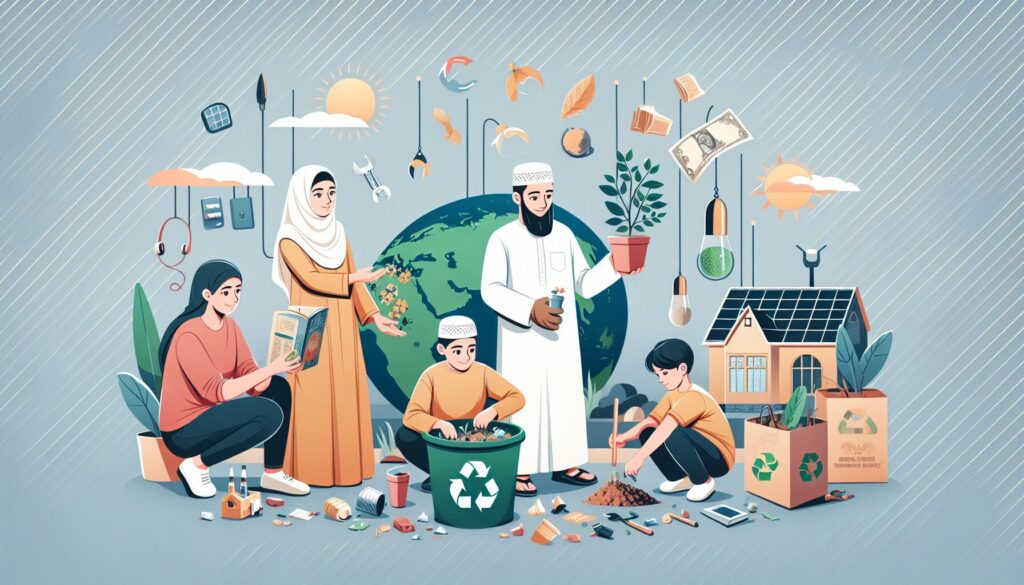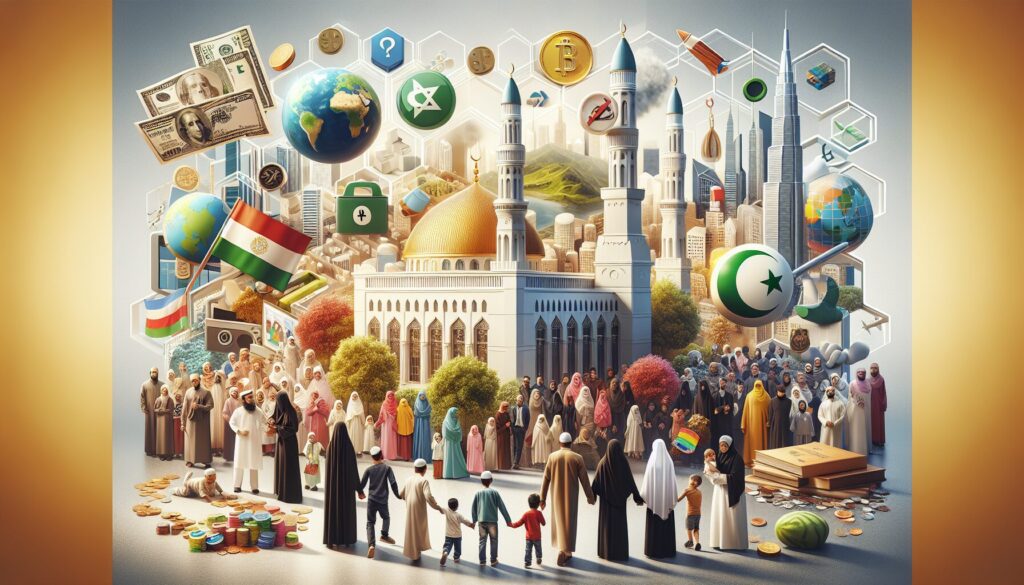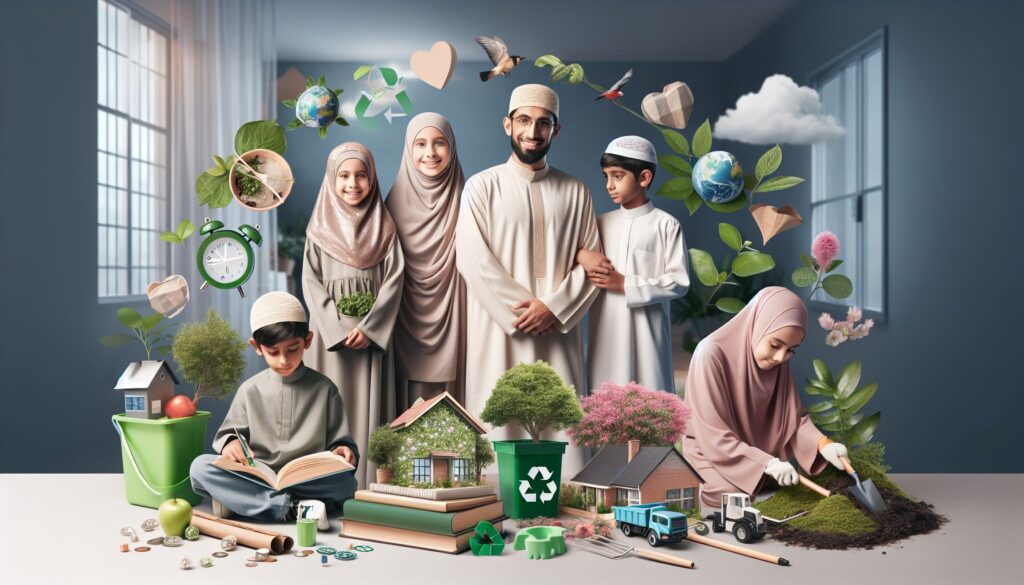Growing up, my grandmother’s stories under the stars about the Prophet Muhammad’s (peace be upon him) teachings on nature ignited my passion for both faith and the environment. Now, I share these tales with my children, hoping to instill a love and respect for Allah’s creation. Islamic principles of environmental stewardship are deeply rooted in the Quran and Hadith, emphasizing the role of Muslims as khalifah, or stewards, of the earth. The Prophet Muhammad (peace be upon him) advocated for moderation and resource conservation, such as using water wisely during ablution. To raise environmentally conscious Muslim children, we can teach them to appreciate nature, reduce waste, recycle, and consume mindfully, reinforced by Quranic and Hadith stories. These practices can cultivate a sense of responsibility and love for the environment in young hearts, demonstrating that every small action can make a significant difference.
Incorporating Eco-Friendly Practices in Daily Life

Incorporating eco-friendly practices into daily life can be a delightful journey for families aiming to raise environmentally conscious Muslim children. It’s about weaving small, sustainable habits into the fabric of everyday living. Here are some practical ways to do just that.
Start with Simple Changes
Making environmentally friendly choices doesn’t have to be daunting. Begin with simple steps, like using reusable bags and bottles. It’s an easy way to introduce kids to the concept of reducing waste. Additionally, you can switch to energy-efficient bulbs, which save energy and reduce electricity bills. These small changes can spark meaningful conversations about conservation.
Another engaging way to foster environmental consciousness is through gardening. Planting a small vegetable or herb garden not only teaches children about where food comes from, but it also instills a sense of responsibility. Kids can learn about the importance of nurturing their plants and the rewards of patience and care. Community gardens are also a fantastic option if space is limited. Check with local initiatives like National Gardening Association to find one nearby.
Incorporate Islamic Values
Islamic teachings strongly emphasize the stewardship of the Earth, which aligns perfectly with eco-friendly practices. Encourage children to connect their daily actions with these values. For example, water conservation is a significant aspect of both eco-friendliness and Islamic teachings. Remind kids to turn off the tap while brushing their teeth or taking shorter showers. Highlight how these actions help conserve this precious resource, aligning with the Prophet Muhammad’s guidance on water usage.
Furthermore, using eco-friendly materials for Islamic rituals can be a meaningful practice. Encourage using biodegradable prayer mats or recycled materials for crafts during Islamic celebrations like Eid. Organizations like Green Muslims offer resources and ideas to integrate these practices into religious activities.
Educational Activities and Community Engagement
Engage children in educational activities that bolster their understanding of environmental issues. Participate in local clean-up events or tree-planting initiatives. These activities not only educate but also empower children to make a tangible difference in their communities. Many organizations like Earth Day Network host events that make learning about the environment fun and impactful.
Utilize storytelling to share tales of environmental heroes from different cultures, including Islamic history, to inspire children. Narratives can be powerful tools to motivate children to emulate these figures. Additionally, encourage them to share their own stories and ideas on how to protect the planet, fostering creativity and leadership.
By incorporating these practices, we’re nurturing a generation of environmentally conscious Muslim children whose actions are guided by both modern sustainability principles and timeless Islamic values. Through these small but significant steps, families can foster a love and respect for our planet that will last a lifetime.
Teaching Children About Sustainability and Conservation
Teaching children about sustainability and conservation is like planting seeds that will grow into a lifelong love for our planet. When I was a kid, my parents used to take me to a local farm every spring. We’d spend hours learning how plants grow and why caring for the earth was essential. That hands-on experience stuck with me, and it’s something I try to pass on to my own kids.
To help your children become environmentally conscious, start by introducing them to simple, everyday practices that make a big difference. Encourage them to turn off lights when they leave a room or to take shorter showers. These small actions teach responsibility and awareness. Additionally, creating a recycling system at home can empower them to understand waste management. Make it a fun activity by decorating bins or setting up a rewards system for diligent recyclers.
Engage with Nature
Children learn best when they can see and touch what they’re learning about. Plan regular visits to parks or nature reserves. Exploring these places can spark curiosity and a sense of stewardship in children. Encourage them to observe how ecosystems function and to ask questions about what they see. This real-world engagement is invaluable for building a connection to nature.
Consider joining community events focused on the environment. Organizations like Green Muslims often hold activities that are both educational and enjoyable for families. Participating in these events can also help children meet others who share their interests, fostering a sense of community and shared purpose.
Storytelling is another powerful tool. Share stories of individuals or groups making positive changes for the environment. Stories about Earth Day Network initiatives, for example, can inspire them to think globally while acting locally. Children love hearing about kids their age who are making a difference, so find examples that resonate with their experiences.
Use educational resources from groups like the National Gardening Association. They offer great tips and activities designed for young learners. Teaching kids to grow their own plants can be particularly rewarding, as it gives them a tangible connection to the earth and the impact of their care.
Engage them in discussions about why these actions matter. Talk about climate change, resource conservation, and the importance of biodiversity in age-appropriate ways. Use analogies they can relate to, like how taking care of their toys ensures they can enjoy them longer. Through these conversations, they’ll develop a deeper understanding and respect for the environment.
Navigating Cultural Challenges in Western Societies

Navigating cultural challenges in Western societies can be quite the adventure, especially when raising environmentally conscious Muslim children. These cultural dynamics involve understanding different values and finding common ground. First, let’s tackle the notion of identity. Many Muslim children in the West balance between their faith and the societal norms around them. This balancing act can sometimes feel like walking a tightrope, but participating in community events, such as creating your own memorable Islamic holiday traditions, can provide a sense of belonging and cultural continuity.
One way to support children is through community engagement. Connecting with organizations like Green Muslims offers young people a platform to share experiences and learn sustainable practices grounded in Islamic principles. Engaging with such communities helps children see that they’re not alone in their journey.
Language and communication also play crucial roles. Encouraging open discussions at home about the importance of the environment, and how Islamic teachings support these values, can be enlightening. When kids understand that their faith encourages stewardship of the Earth, it strengthens their sense of responsibility. Introduce them to stories and examples from the National Gardening Association to showcase how gardening can be both a fun and eco-friendly activity.
Building Bridges through Education
Education in schools can sometimes present challenges. Curriculum content might not always align with Islamic perspectives on environmentalism. Therefore, it’s vital to supplement school learning with teachings from the Quran and Hadith. This approach ensures children understand how their cultural heritage aligns with caring for the planet. Organize study groups or workshops that focus on these teachings to give children a more rounded view.
Additionally, collaborating with educators can create opportunities to introduce Islamic perspectives on environmental issues in the classroom. Finding commonalities like Earth Day celebrations can be a great starting point. Reach out to the Earth Day Network for resources or ideas on how to involve schools in eco-friendly activities that resonate with Islamic teachings.
Another challenge is dealing with peer pressure. Children might encounter situations where their eco-friendly choices stand out. Empower them by highlighting the positive impact of their actions. Share stories of young activists who’ve made a difference, regardless of their cultural background. This reinforces the idea that they, too, can be agents of change.
By fostering a nurturing environment that embraces both faith and ecological responsibility, parents can help their children not only navigate but thrive in Western societies. The journey is undoubtedly nuanced, but with the right support and resources, it’s entirely achievable.
Engaging with Community and Islamic Organizations

When it comes to nurturing environmentally conscious Muslim children, engaging with community and Islamic organizations can be a game-changer. In my own experience, nothing beats the sense of belonging and inspiration these groups offer. They provide a platform where kids learn about environmental stewardship through the lens of Islamic teachings. Let’s dive into some practical ways these organizations can be a part of your journey.
Islamic centers often host events focused on sustainability and environmental education. These events can be anything from community clean-up days to workshops on sustainable living. The beauty of these gatherings is that they combine environmental action with spiritual growth. For instance, Islamic Society of North America often organizes eco-friendly workshops that blend environmental science with Islamic principles.
Collaborative Opportunities
Collaborating with organizations like Green Muslims can open doors to unique opportunities. They often have programs that encourage youth to actively participate in environmental conservation. By getting involved, your children not only learn but also contribute to a greater cause. This hands-on involvement helps them understand the impact of their actions and how they align with Islamic values.
Moreover, checking out initiatives by Earth Day Network can be incredibly rewarding. These collaborations often focus on global issues like climate change, providing a broader perspective. It’s an excellent way for kids to see how their local actions fit into a global puzzle. These experiences can be eye-opening and empower them to take meaningful action.
Additionally, volunteering as a family at community gardens or food banks can instill a sense of responsibility and empathy in children. When kids see their parents actively participating, they understand the importance of these values. It’s a fantastic way to bond and discuss how our actions reflect the teachings of the Quran and Hadith.
Participation in these community-driven efforts not only reinforces the importance of environmental stewardship but also strengthens their connection with the community. It creates a sense of shared purpose and fosters long-lasting friendships with like-minded families. Engaging with these organizations can truly enrich your family’s journey towards environmental consciousness.
Conclusion
Ultimately, nurturing environmentally conscious Muslim children through the integration of Islamic teachings and eco-friendly practices is a rewarding journey that fosters a deep respect for our planet. By weaving sustainable habits into daily life, engaging with community and Islamic organizations, and providing educational experiences grounded in both faith and environmental stewardship, we empower the next generation to be responsible caretakers of the Earth. May your family’s journey be filled with growth, understanding, and a shared commitment to protecting our beautiful world. Happy nurturing!
Continue Exploring
Dive into the vibrant celebrations of Eid right here in New Zealand! Discover the best spots to experience the joy and cultural richness of this festive occasion.
Frequently Asked Questions
How can Islamic teachings be incorporated into raising environmentally conscious children?
Islamic teachings can be incorporated by emphasizing the concept of being a khalifah or steward of the earth, as taught in the Quran. Parents can share stories from the Quran and Hadith that highlight the importance of environmental care, such as the Prophet Muhammad’s advice on water conservation. Encouraging children to connect their daily actions with these values can foster responsibility and respect for the environment.
What are some practical eco-friendly practices families can adopt?
Families can start with simple changes like using reusable bags and bottles, switching to energy-efficient bulbs, and creating a recycling system at home. Engaging in gardening, whether at home or in community gardens, can teach children about food sources and responsibility. Additionally, using eco-friendly materials for Islamic rituals, such as biodegradable prayer mats, can further instill sustainable habits.
How can community and Islamic organizations support raising environmentally conscious Muslim children?
Community and Islamic organizations provide platforms for learning about environmental stewardship through Islamic teachings. They often host events like workshops on sustainable living and community clean-ups. Collaborating with organizations like Green Muslims or Earth Day Network can offer children opportunities to participate in conservation efforts, fostering a sense of belonging and empowerment.
Fatima Ansari is an Islamic educator and writer with over a decade of experience teaching Quran and Islamic studies to children and families in Western Muslim communities. Growing up in North America, she saw firsthand the challenges Muslim families face in balancing faith with modern life, which inspired her to share practical guidance rooted in the Quran and Sunnah. Her mission with E-Quran Learning is to make Islamic education accessible, relatable, and inspiring for Muslim families across the United States, United Kingdom, Canada, Australia, and New Zealand.






